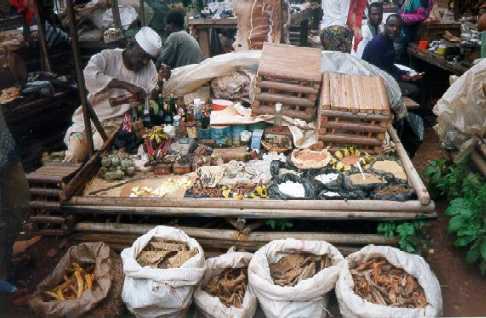
Official Peace Corps Information on Programs in Cameroon
The modern state of Cameroon was created in 1961 following the unification of two former colonies, one British and one French. Since then it has struggled from one-party rule to a multiparty system. Cameroon has one of the highest literacy rates in the continent. While experiencing improvement in the general quality of life in recent years, the people of Cameroon continue to live with inadequacies in the health care and education systems, as well as in the management of their natural resources and economic systems.
The government continues to open new schools to address the educational needs of youth, but faces a shortage of qualified teachers. Water-borne illnesses, poor nutrition, and sexually transmitted diseases are preventable conditions that threaten health in many rural areas. A majority of the population continues to work the land using damaging practices. Volunteers concentrate their efforts at the grass-roots level in classroom instruction, teacher training, agriculture, agro-forestry, and health. A new Small Enterprise Development project, initiated in 2000, addresses the growing needs in the business sector.
Education
Providing the ever-expanding school-age population with a quality education remains a challenge for the Cameroonian government. Volunteers help improve the quality of education by teaching classes in English, math, and science and by developing teaching materials applicable to Cameroonian life. Students' classroom knowledge is supplemented with health and environmental education curricula integrated into daily lessons. Volunteers bring innovative techniques to the classroom with new teaching approaches that enhance students' critical thinking skills and improve the teaching skills of their Cameroonian counterparts.
In FY 2000, Volunteers taught more than 21,000 Cameroonian students in science and mathematics and approximately 9,000 students in English language skills and HIV/AIDS prevention techniques. One hundred and sixty teachers were trained in 4-MAT lesson planning methodology and communicative teaching techniques. Volunteers and their counterparts promote the Global Learning and Observation to Benefit the Environment (GLOBE) program in their daily classroom activities.
Environment
Due to population growth and increasing competition for land in Cameroon, some farmers have begun to cultivate on steep hillsides and into ecologically important forested areas. These practices accelerate soil erosion, degradation of existing farmland, and desertification. Volunteers in the humid highland zone and the Sahel region are working to establish a network of farmer leaders who will understand the benefits of agro-forestry and permanent farming systems, and who will teach these activities to other farmers.
In 2000, Volunteers introduced more than 3,800 community members to the concepts and benefits of agro-forestry and permanent farming systems. With the assistance of Peace Corps Volunteers, farmers established 145 nurseries, which produced nearly 100,000 seedlings, and created 118 seed banks to store tree seeds.
Health
In Cameroon, the doctor to patient ratio is 1: 12,500, the infant mortality rate exceeds six percent, and only half the population has access to safe drinking water. The HIV/AIDS pandemic has emerged as one of the most pressing social health concerns, with an estimated six percent to seventeen percent of the population infected. Volunteers work primarily on prevention activities that encourage communities to assess local health and water/sanitation problems, prioritize these concerns and identify appropriate interventions. These activities, undertaken in collaboration with host country nationals, help empower local individuals to solve health and water/sanitation-related problems and to take responsibility for their own development. Health Volunteers collaborate closely with Teaching English as a Foreign Language (TEFL) and Agro-forestry Volunteers. Their combined Volunteer efforts have resulted in workshops on fruit drying, community tree planting projects and gender related issues. Increasing numbers of community members are exposed to family health education activities targeting preventive health and improved water/sanitation practices.
Business Development
The informal sector of the economy is of growing importance in Cameroon. However, very little exists to nurture this growth and support micro-enterprise development. Peace Corps Cameroon has responded to these needs by initiating a new small enterprise development project. The project aims to link Volunteers with credit and savings organizations, which will provide entrepreneurs with credit and the entrepreneurial skills necessary to effectively use that credit. Volunteers collaborate with government ministries and non-governmental organizations (NGOs). They also work with local counterparts to provide entrepreneurial skills to marginalized socio-economic groups in the informal sector so that they can better manage their businesses as well as the credit they receive.
Volunteers and host country nationals are taking steps to improve communication regarding local credit institutions' lending practices. Volunteers work with credit committees to insure that loan recipients are fully qualified and able to reimburse the credit before a final decision is made.